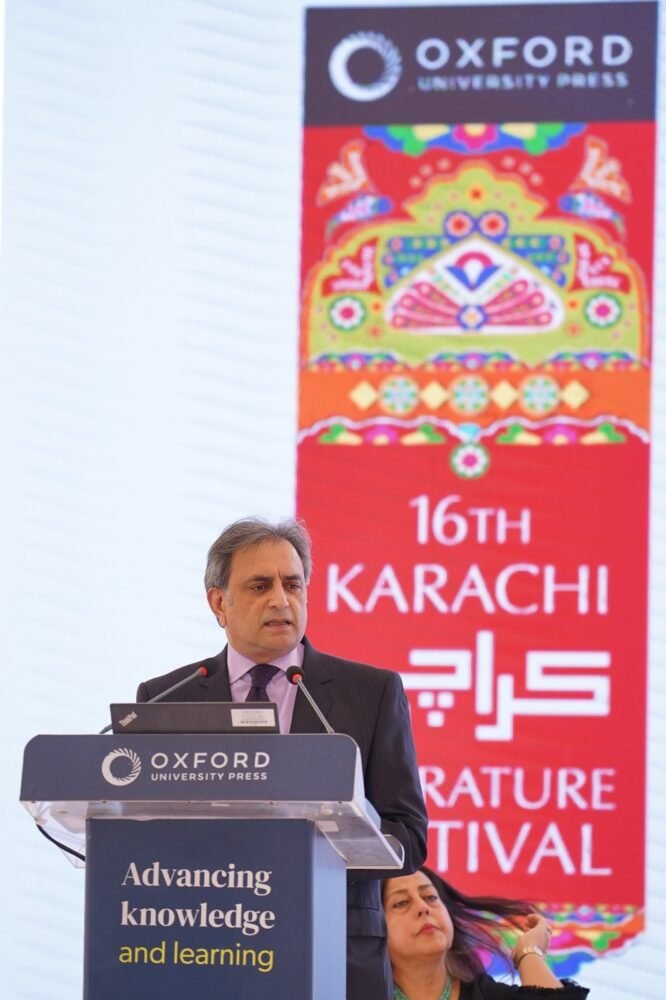Herald Special Correspondent
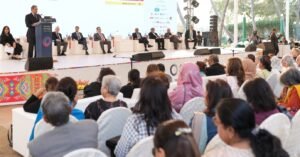
Karachi: The 16th Karachi Literature Festival (KLF) concluded on Sunday, Feb 9, after three days of impassioned dialogue, cultural performances, and literary exploration. Themed “Narratives from the Soil,” the event brought together academics, writers, thinkers, artists, and policymakers from Pakistan and beyond, to explore stories rooted in local landscapes while addressing global challenges.
The festival featured Sindh government officials, diplomats, and literary luminaries, emphasizing the need to uphold and endorse the ‘narratives from the soil’ as voices of the people across the landscape, urban resilience, and literary innovation.
Organized by Oxford University Press Pakistan and supported by the Sindh Government, HBL, and Getz Pharma, the festival drew thousands to the Beach Luxury Hotel, cementing its reputation as South Asia’s premier literary gathering.
Over 50 sessions, 30+ book launches, and vibrant youth engagement underscored literature’s power to bridge divides and amplify Pakistan’s cultural heritage.
Setting the Tone
Art historian F.S. Aijazuddin and playwright Asghar Nadeem Syed, in their keynote speeches, emphasized the power of storytelling in preserving cultural identity and shaping societies.
Aijazuddin noted, “It is imperative to hear the stories for true transformation. Pakistan’s history and narratives are powerful, and I am happy to see them flowing on such a worthy platform.” Syed added, “A story is only complete when it fulfills a certain structural compliance; however, tales can carry messages that are complete in themselves.”
A special launch of ‘Journey Through Chaos’ featured a panel discussion with Saeed Ghani, journalist Mazhar Abbas, senator Mushahid Hussain Syed, and journalist Wusatullah Khan, moderated by Ahmed Shah.
Ghani highlighted the value of culture in social development: “Sindh has one of the most iconic historic legacies in the world, and it is our mutual responsibility to enable this land to be visible globally for its magnificent legacy and literary richness.”
The concluding session featured former Senator Khushbakht Shujaat and journalist Mishal Husain. Shujaat emphasized the importance of platforms like KLF: “Platforms like these are democracy’s oxygen.”
Husain underscored literature’s role in societal progress: “Art and literature define a society.” She captured the festival’s ethos: “KLF is where Pakistan’s soul finds its voice,” and declared it a conduit for social change, amplifying stories that shape identities.
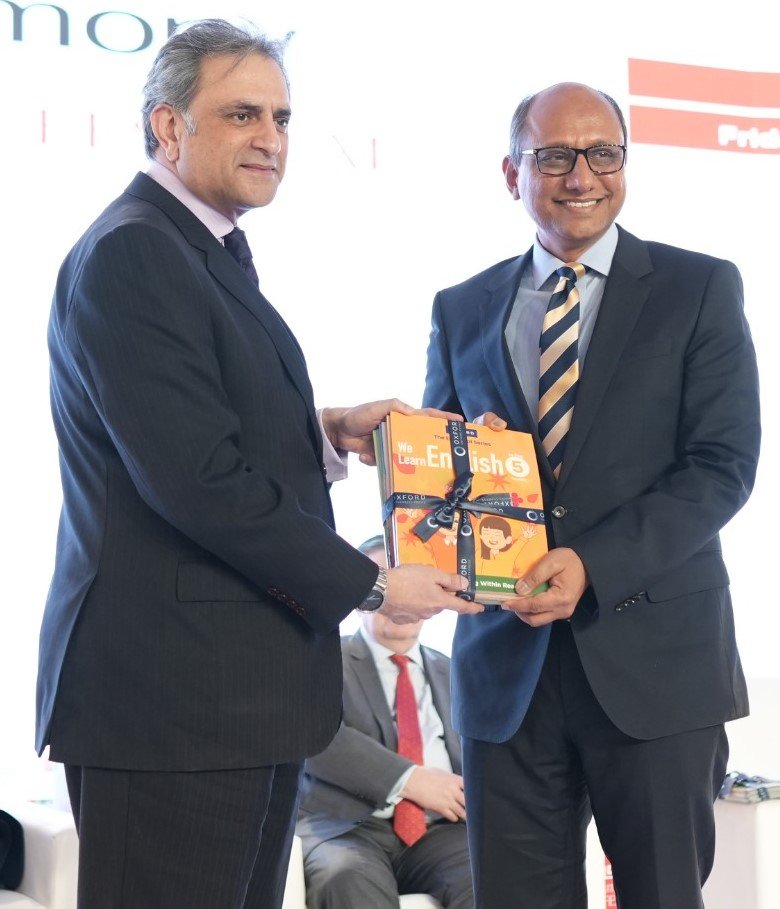
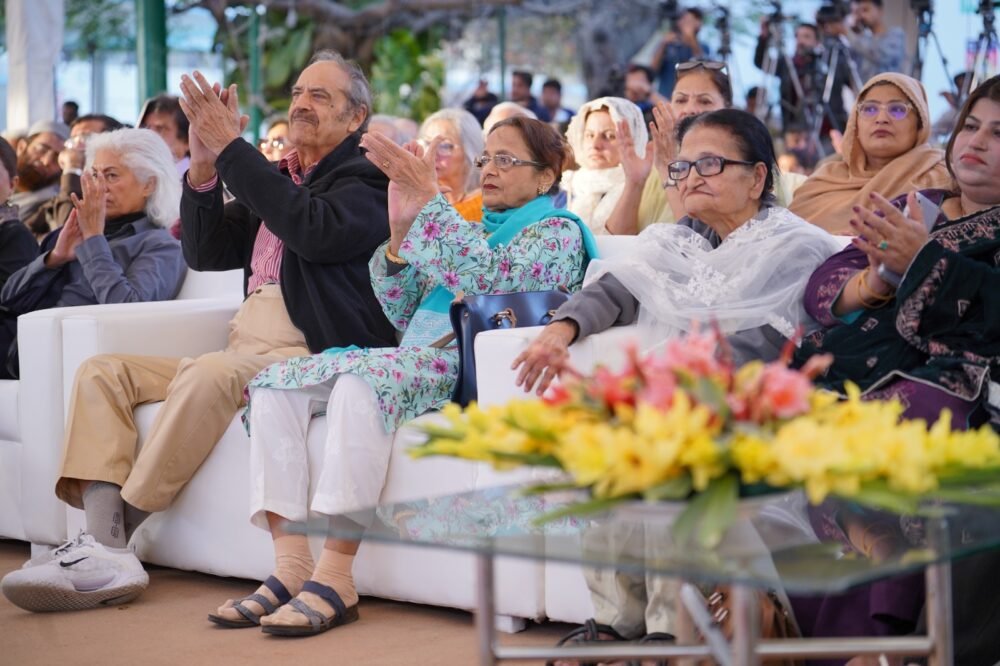
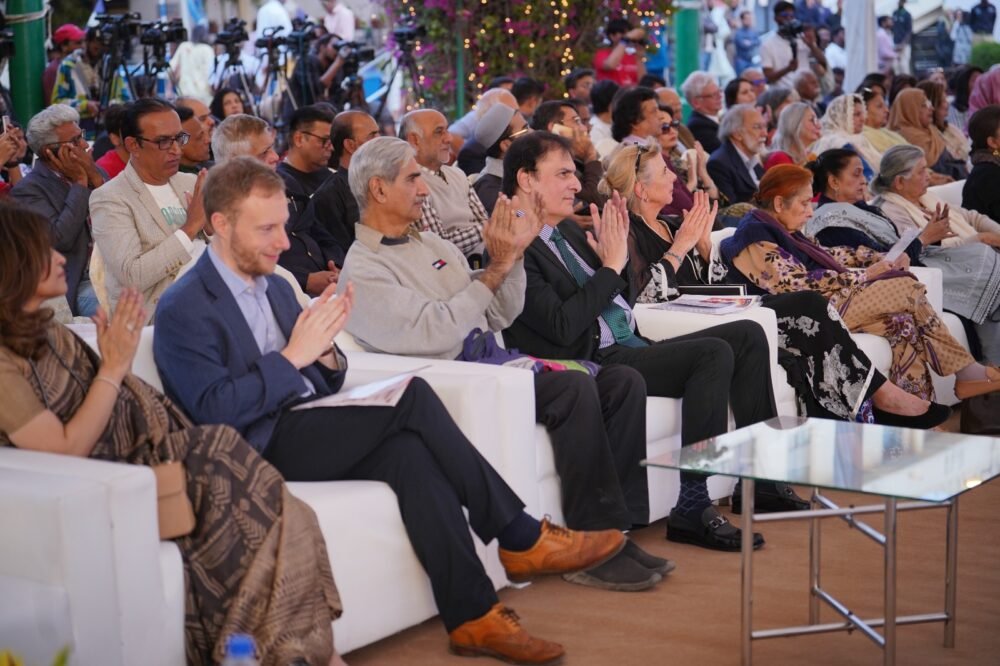
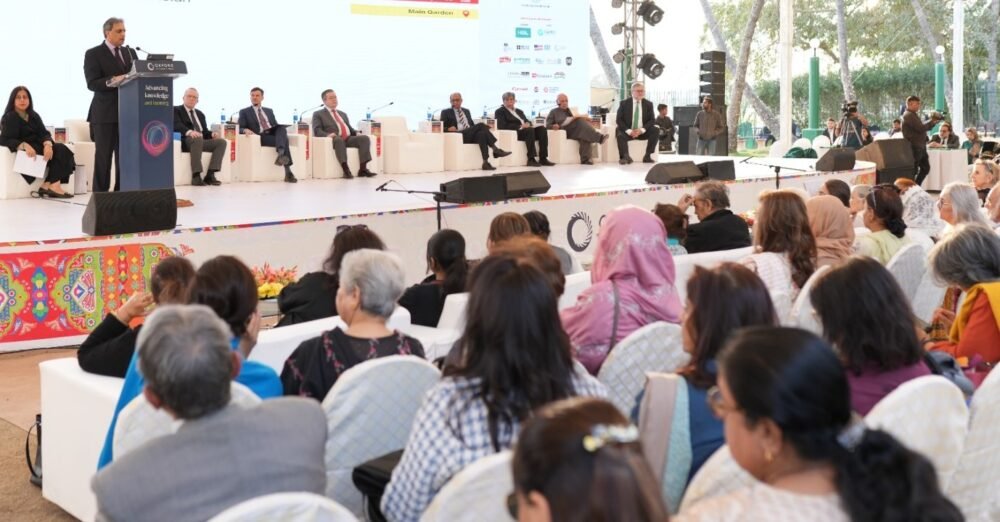
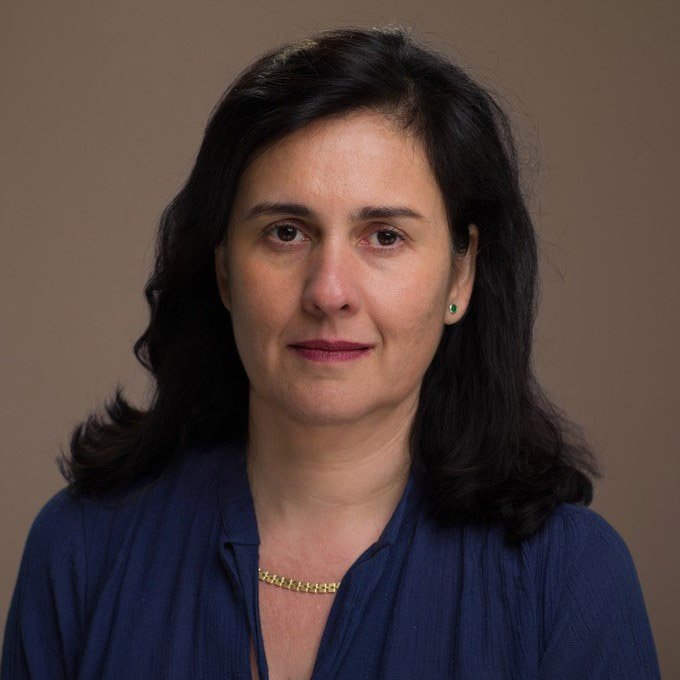
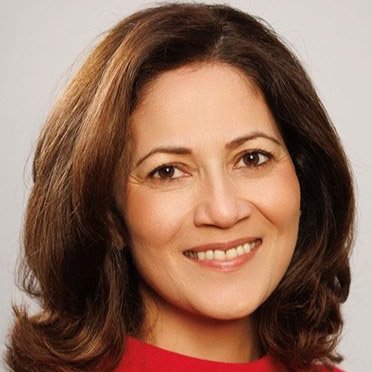
Diverse Perspectives
French ambassador Nicolas Galey, Counsel General Alexis Chahtahtinsky, US Consul General Scott Urbom, and Deputy Head of Mission, British High Commission Martin Dawson, in their remarks, emphasized the significance of literary initiatives.
Khalid Mahmood, Managing Director of Getz Pharma, succinctly summed up the event: “KLF is where Pakistan’s soul finds its voice.” Maya Inayat Ismail, Chairperson of the Sustainability Forum HBL, reinforced their commitment to empowering and supporting literary initiatives like KLF.
Arshad Saeed Husain, MD of OUP Pakistan, in his welcome speech on the opening session on Feb 7, stated, “Oxford University Press Pakistan continues its drive not just to promote the culture of reading and discussions but to truly distinguish the enriching legacies that geographies must share.”
He emphasized the festival’s mission: “We aim to spotlight ‘Narratives from the Soil’—stories that distinguish our geographies and identities,” and thanked all stakeholders, guests, speakers, and people of Karachi for their continued commitment to the festival.
Devolution, Democracy, Legal Flaws
Karachi’s chaos took center stage in ‘Urban Dialogue: The Karachi Katchehri.’ Mayor Murtaza Wahab clashed with urbanists Mansoor Raza and Bilal Hassan on governance failures. “Decentralize or collapse,” argued Raza, as Wahab conceded, “Our systems are outdated for a megacity.” Moderator Mahim Maher distilled it: “Karachi’s story is one of resilience, but that needs reimagining.”
Former Senate chairperson Raza Rabbani and Senator Hamid Khan critiqued Pakistan’s legal frameworks and constitutional flaws. They explored the barriers and flexibility in the legal landscape, advocating judicial transparency and grassroots empowerment. Rabbani asserted, “Democracy isn’t a courtroom drama.” Hamid Khan and Faisal Siddiqui’s discussion, moderated by Salahuddin Ahmed, echoed similar sentiments in ‘We the People: Our Constitution and the Rule of Law.’ This session also included Raza Rabbani, Abid Zuberi, Sara Malkani, Salahuddin Ahmed, and Zameer Ghumro, led by Ayesha Tammy Haq.
Pakistan’s urban design and architects’ evolution since 1947 was brought to light by Zarmeene Shah in discussion with H.M. Naqvi, Marvi Mazhar, and Kiran Ahmad.
Experts Ikram Sehgal and Salma Malik explored diplomatic reset opportunities in Pakistan-Bangladesh ties, stressing shared histories.
Economy: Crisis, Critique, and Solutions
A panel featuring ex-Finance Minister Miftah Ismail, economist and journalist Khurram Husain, and industrialist Arif Habib dissected Pakistan’s economic turmoil and systemic failure. Husain revealed a “30% erosion of daily wage earners’ purchasing power since 2021,” blaming IMF-mandated austerity. He noted, “We are no longer in the midst of a ferocious inflationary fire — that fire has been extinguished — the default cliff has been pulled back so that’s one place the economy stands but here’s where the good news ends.” He criticized the reliance on high interest rates and currency devaluation, saying, “You cannot start unwinding the entire thing by granting sector-specific tax relief to industry groups the moment you successfully stabilize the economy.”
Ismail criticized the government’s “lack of focus on citizen welfare” and advocated for privatization, energy reforms, and direct cash transfers to the poor. They proposed drastic cuts in non-development expenditures, decentralizing power, and reducing the federal footprint. Ismail lamented the poor state of education and rampant corruption in public sector development projects, noting Pakistan’s high electricity prices compared to other countries. He proposed solutions like devolution of power to local governments and direct cash transfers to those below the poverty line.
The issue of sustainability in business was explored in ‘Integrating Impact and Sustainability into Business, Investment, and Life,’ moderated by Ali Habib, with Martin Dawson, Maya Inayat Ismail, and Qasim Ali Shah. Muhammad Azfar Ahsan led a PowerTalk on Pakistan’s economy and business climate with Khurram Schehzad and Amjad Waheed.
Demographic Dilemmas & Digital Noise
In ‘Pakistan’s Population: Time Bomb or Dividend?’ experts Azra Fazal Pechuho, Lubna Naz, Rehana Ahmed, and Khalid Masud, moderated by Naeem Sadiq, discussed policies, challenges, and opportunities posed by Pakistan’s demographic trends. They called for “investing in youth skills over panic.”
With literary stalwarts dotting the three-day events, KLF proved to be a hub of stimulating conversations, theatre performances, book launches, and dialogues exploring literature and society. Through the vibrant tapestry of narratives rooted in the rich heritage of Indus, KLF celebrated the diverse voices that shape our collective identity.
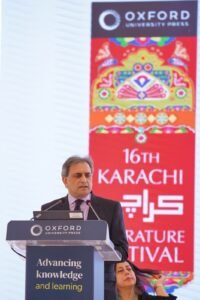
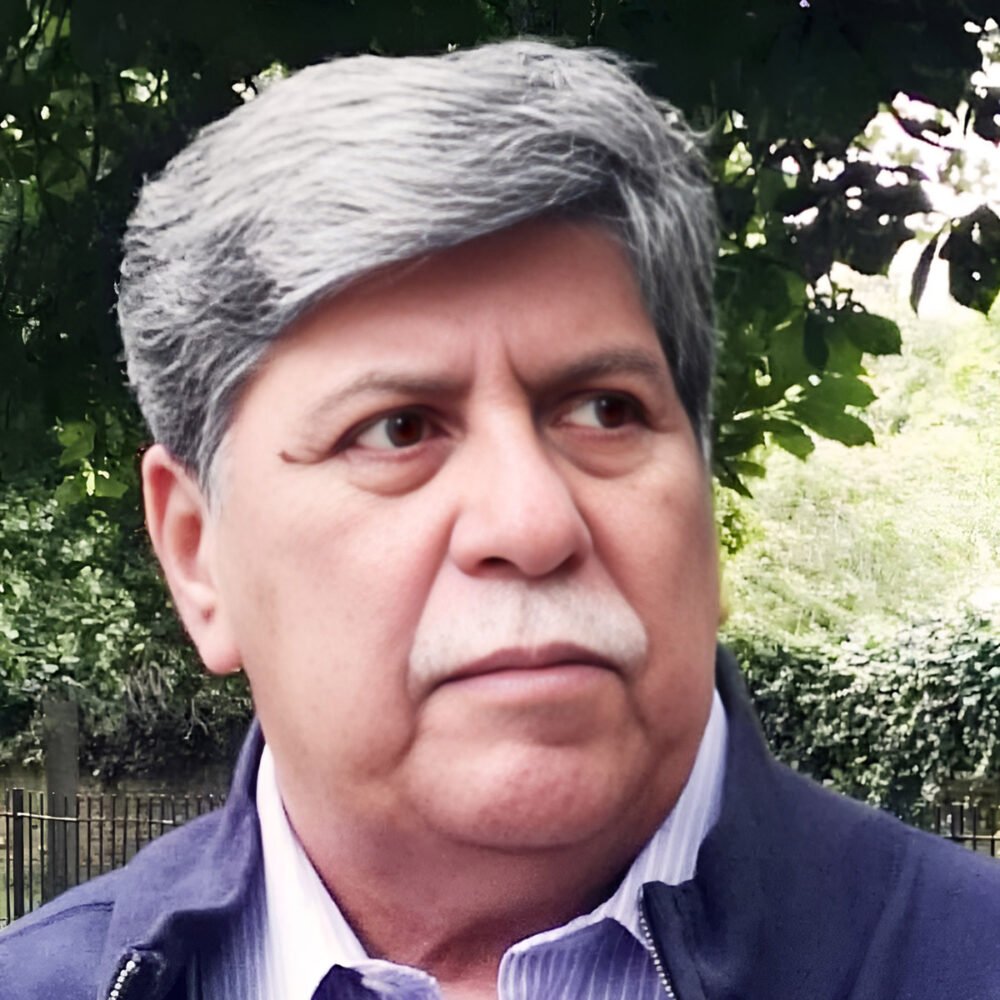
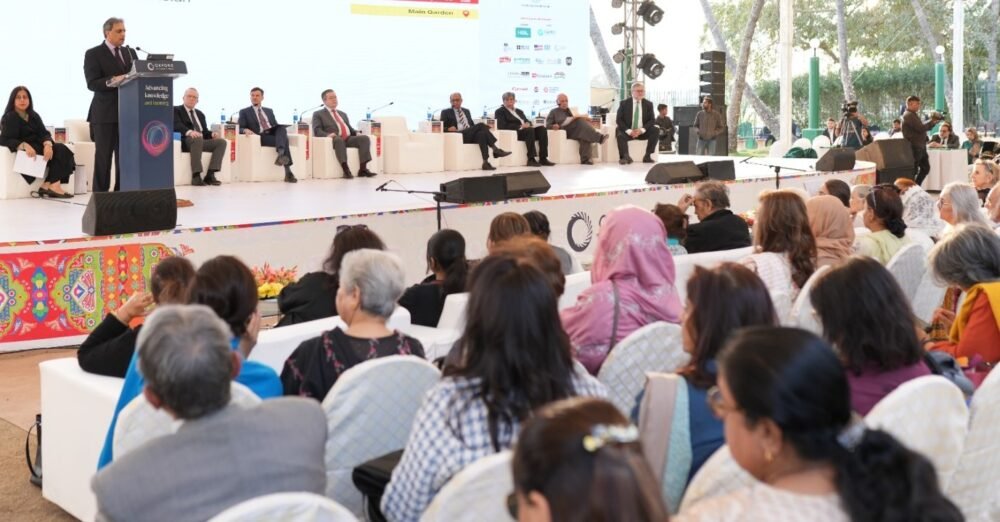
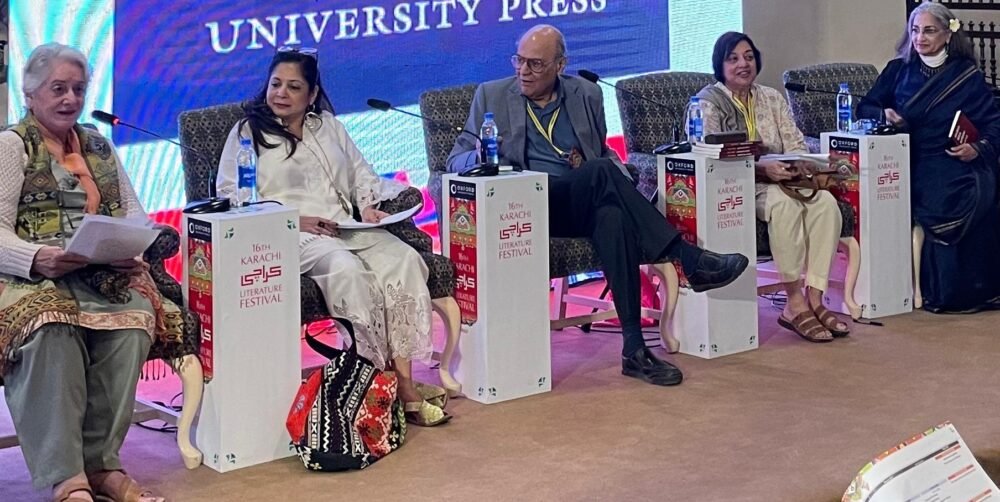
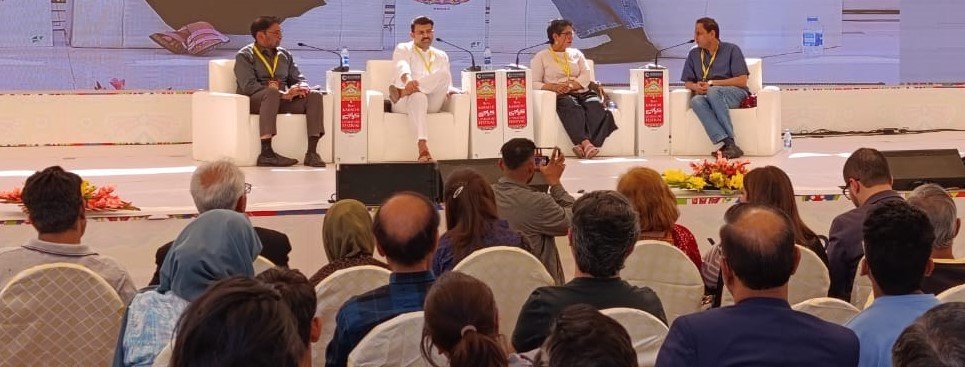
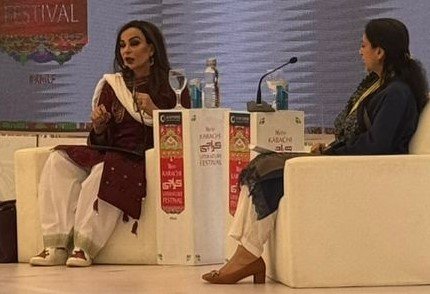
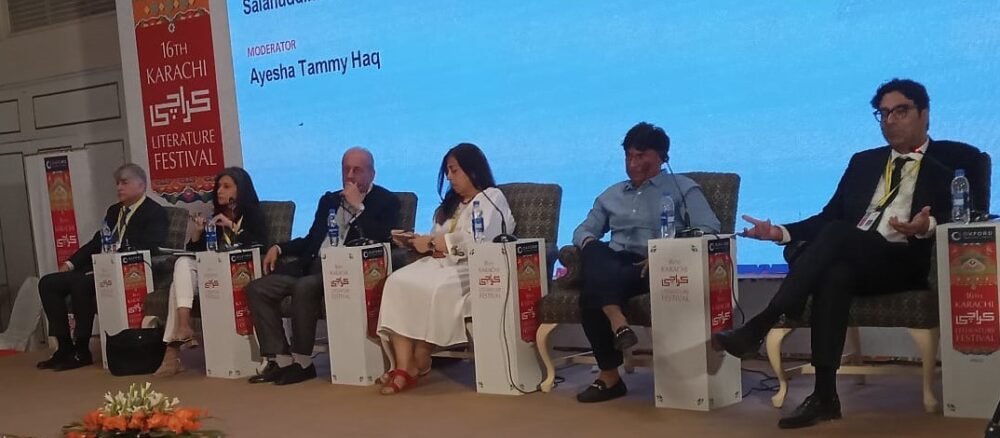
Education & Technology: Reimagining Futures
Education emerged as a cornerstone of KLF 2025, with panels dissecting systemic reforms and technological integration to bridge Pakistan’s learning gaps. Across sessions moderated by Faisal Bari and Neda Mulji, experts called for a radical overhaul of pedagogy, governance, and access.
In ‘Call to Action: Transforming Education,’ luminaries like Dr. Pervez Hoodbhoy and Shahid Siddiqui lambasted outdated syllabi, urging a shift from rote learning to critical thinking. Hoodbhoy warned, “Our classrooms still mirror colonial-era models,” highlighting disparities in rural vs. urban access. Myra Murad Khan stressed gender-responsive curricula, while Farid Panjwani advocated integrating indigenous histories to foster cultural pride.
The ‘From Emergency to Empowerment’ session, featuring Shehzad Roy and Arshad Saeed Husain, showcased successful collaborations. Roy’s Zindagi Trust model—transforming government schools through community engagement—was hailed as a blueprint. Khadija Bakhtiar argued, “Partnerships aren’t charity; they’re strategic investments,” citing Punjab’s tech-driven enrollment drives.
The debate peaked in ‘The Role of AI in Step-Changing Outcomes,’ where Salma Alam and Hammad Malik clashed over automation’s limits. Zeeshan Hassan cautioned, “Tech can’t replace teachers—it’s a tool, not a savior.” Panelists unanimously urged safeguards against algorithmic bias, stressing the irreplaceable value of human mentorship.
In ‘Are We Listening to Our Youth?’ Faisal Mushtaq and Nadeem Ghani unveiled startling data: 68% of students feel curricula ignore their aspirations. Proposals included vocational training hubs, student-led policy councils, and gamified learning. Ghani urged, “Let students co-create their futures,” as Khadija Bakhtiar spotlighted EdTech startups bridging the skills gap.
The discourse distilled a clear mandate—merge technology with empathy, policy with participation, and tradition with innovation. As Faisal Bari concluded, “A child in Thar deserves the same curiosity-driven learning as one in Karachi. That’s our moonshot.”
The session ‘Kaghazi Mehek Roothnay Ko Hai’ explored the shift from print to e-books, with Maniza Naqvi noting digital platforms’ role in democratizing literature and enhancing accessibility
Climate Change: From Awareness to Action
Climate change formed a core topic in various discussions, particularly in the conversation with Senator Sherry Rehman and educationist Ambreena Ahmed. Senator Rehman declared climate awareness a top priority by integrating climate education into curricula: “It is only through education that we can instill a long-term framework for our nation to become resilient for this devastating change in the wings.” She championed Pakistan’s first climate curriculum, stating, “Resilience begins in classrooms,” while ‘From Learning to Leading’ panelists urged youth-led environmental action.
Climate advocacy also received attention in ‘From Learning to Leading: Climate Education and Advocacy,’ featuring Afia Salam, Syeda Rinam Fatima, Athar Osama, Tabinda Jabeen, and Danish Rashdi, moderated by Maha Husain. Environmental justice and literature intersected in ‘From Chapters to Change: Literature and Environmental Justice,’ with Uzma Aslam Khan, Tariq Alexander Qaisar, and Saba Pirzadeh exploring the evolving ambit. The session was moderated by Framji Minwalla. Youth-led panels like ‘From Learning to Leading’ demanded action over tokenism. Activist Afia Salam urged: “Stop tokenism—hand us the mic.”
Media and Social Media
A conversation titled ‘Have Electronic & Social Media Eroded the Quality of Political Debate?’ featured media persons Azhar Abbas, Amber Rahim Shamsi, Shehzad Ghias Shaikh, and Faisal Subzwari. The panelists scrutinized the role of modern media and social impact with Nadeem Farooq Paracha. Ms. Shamsi critiqued social media’s “echo chambers eroding nuanced debate,” analyzing its impact on political discourse while Abbas warned, “Virality shouldn’t replace validity.”
Ayesha Mian, Azhar Abbas, Noor Ahmed, and Sajjad Syed discussed media’s impact on youth’s mental health and the role of organizational leadership with Humair Yusuf as moderator. The session focused on the missing responsibility of media leadership in fostering mental well-being.
Youth Pavilion and Creativity
This year, the launch of the ‘Youth Pavilion’ proved to be a vibrant hub of creativity, featuring interactive and entertaining sessions. Young talent was celebrated in ‘Young Authors and Poets’ with Scherazade Jamali. The Youth Pavilion buzzed with TikTok poets, rap artists, and graphic novelists reimagining heritage. Atif Badar’s Theatre Fun and Games had teens rewriting Faiz in street slang, while Heroes in Frames saw Sheema Kermani urging, “Redraw icons, but don’t erase history.”
Heritage Meets Modernity
The session ‘Sachal, Sami, Lateef’ honored Sindhi mystics. Moderated by Sher Muhammad Mehrani, the session featured scholars Jami Chandio and Madad Ali Sindhi. Artists Babar Mangi and Ash Rohan hailed the genre’s emergence: “When the mic is ours, the narrative shifts.”
The festival celebrated both contemporary voices and classical works like ‘Three Tales from Gulistan-i-Saadi.’ The literary discourse acknowledging the giants of Urdu literature today, ‘Urdu ki Taza Bastiaan,’ featured celebrated poets and authors Iftikhar Arif, Harris Khalique, and Ashfaq Hussain, moderated by Zarminae Ansari. Senator Sherry Rehman and Victoria Schofield held a conversation on their “Journey of Friendship and Political Activism” while exploring aspects of Victoria’s book “The Fragrance of Tears: My Friendship with Benazir Bhutto.”
From artistic exploration in ‘Interrogation of Amin Gulgee’ to women’s empowerment in ‘Born to Struggle,’ the launches reflected Pakistan’s rich literary landscape. Acclaimed novelist Kamila Shamsie took the stage in ‘Weaving Worlds with Words,’ conversing with Hasan Zaidi about her writing journey. Kamila Shamsie reflected on familial bonds shaping her work: “Family impacts every word on the page.”
A tribute session, ‘Ode to Our Fathers,’ celebrated the legacies of literary figures such as Hameed Akhtar and Talat Hussain, with personal reflections from Saba Hamid and Tazeen Hussain, moderated by Harris Khalique. Poetry enthusiasts were treated to ‘Kuchh Ghazalain, Kuchh Nazmain,’ where Moazzam Ali Khan shared his work, moderated by Maya Khan. Karachi’s literary and poetic heritage was explored in ‘Karachi: Kahaaniaan aur Nazmain,’ featuring Raja Shehzad, Sajjad Ahmed, and Afzal Ahmad Syed, with Peerzada Salman as moderator.
Urdu literature was celebrated in ‘Aaina Dekha Na Jaaye,’ featuring Kishwar Naheed, Shama Afroz, Aijaz Mangi, and Saabhiyan Sangi, moderated by Aqeel Abbas Jaffri. The legacy of renowned literary figures was revisited in ‘Aik Sadi Ka Qissa,’ focusing on Nasir Kazmi, Jameeluddin Aali, Intizar Hussain, and others, with insights from Najeeba Arif and Mubeen Mirza, moderated by Irfan Javed.
Poetry and literature remained at the heart of KLF 2025, with sessions such as ‘Voices by the Sea: English Verse,’ where poets including Minaa Shahzad, Salman Tarek Kureshi, Adrian Husain, Fatima Ijaz, Peerzada Salman, Moeen Faruqi, and Moosa Gardezi shared their verses under the moderation of Zarmina Raza. The global influence of English literature was examined in ‘Finding a Voice in World English Literature,’ featuring Taha Kehar and Shazaf Fatima Haider, moderated by Nusrat Khwaja.
Performing Arts: Stage, Screen, and Satire
Continuing the spotlight on performing arts, the session ‘Emergence of Urdu Rap in Pakistan’ featured Arshad Mahmud, Babar Mangi, and Ash Rohan. Moderated by Anoushey Ashraf, the panel discussed the growth of the genre. Grips Theatre’s adaptation of ‘Dr Faustus’ and Atif Badar’s ‘Theatre Fun and Games’ reimagined classics. The festival culminated in a transcendent qawwali by Ustad Farid Ayaz and Abu Muhammad, leaving audiences spellbound.
Entertainment and film discussions saw ‘Karachi Comedians: Stage or Insta?’ with Ammar Zaidi, Ali Abdullah, Akbar Chaudry, and Natalia Gul debating the evolving comedic landscape.
A special film screening of ‘In Flames’ brought together literature and cinema. The film is a searing take on patriarchal violence, leaving audiences silent. “Stories like these are our armor,” director Zarrar Khan later said. In ‘Sitar Aur Gayeki: A Tribute to the Masters,’ led by Suhel Rais Khan, with an introduction by Malahat Awan, kept the notes alive. The day concluded with the film screening of Nayab. Grips Theatre presented Thomas Mann’s ‘Dr Faustus,’ performed by Khaled Anam. The Khwab Dance Company, led by Mohsin Babar, also performed.
The rise of television and the constant strife between art and popularity was explored in ‘Chhoti Screen ki Bari Fatoohaat,’ featuring Noorul Huda Shah, Saba Hamid, Nadeem Baig, and Sarmad Khoosat, moderated by Shaista Lodhi.
Young poets took center stage in ‘Shaairi ke Rung, Jawanon ke Sung,’ led by Ambareen Hasib Ambar and Abdul Rehman Momin, featuring Ali Zaryoun, Umair Najmi, Dilawar Ali Aazar, Naeem Sameer, Sadiq Marri, Zahida Raeesi, Amar Pirzado, Sabeela Inam Siddique, and Imtiaz Danish.
The session ‘Crime Fiction and the Pursuit of Justice’ brought bestselling author Omar Shahid Hamid into conversation with Tooba Masood-Khan. Poignant references and humorous anecdotes filled ‘Moin Akhtar: One Man Show,’ featuring Anwar Maqsood, Zeba Shahnaz, Faisal Qazi, and Ghazal Ansari. Maqsood celebrated the comedy legend’s legacy, recalling “his genius in making tragedy laughable.”
Book Launches
The festival also celebrated the launch of 30+ books, spanning diverse genres and themes, including the Urdu translation of Han Kang’s Nobel-winning ‘The Vegetarian.’ The lineup included Mishal Husain’s ‘Broken Threads,’ exploring empire and independence, and Pervez Hoodbhoy’s thought-provoking ‘Pakistan: Origins, Identity, and Future.’ A tribute to literary giant Bapsi Sidhwa, led by Kamila Shamsie and Uzma Aslam Khan, highlighted her contributions to postcolonial literature.
Mushaira Magic
The highly anticipated and traditional Urdu Mushaira, presided over by noted poet and intellectual Iftikhar Arif, created a wave of resonance with the crowd. Poets like Ashfaq Hussain, Pirzada Qasim, Sabir Zafar, Shahida Hassan, Najma Usman, Mehboob Zafar, Nasira Zuberi, Harris Khalique, Inaam Nadeem, Shabbir Nazish, Peerzada Salman, and Salman Sarwat wove verses on loss and longing, as the crowd sighed, “Wah!”
Awards: Celebrating Literary Excellence
Awards, sponsored by Getz Pharma, were given to Bina Shah’s ‘The Monsoon War’ (geopolitical thriller, English fiction); Saeed Shariq’s ‘Koh Malaal’ (Urdu Poetry); and Jeem Abbasi’s contributions (Sindhi Literature). In the Urdu Prose category, an award went to Shafqat Naghmi for his novel ‘Saat Janam,’ and the award on Sindhu was given to Jeem Abbasi.

The High Asia Herald is a member of High Asia Media Group — a window to High Asia and Central Asia

